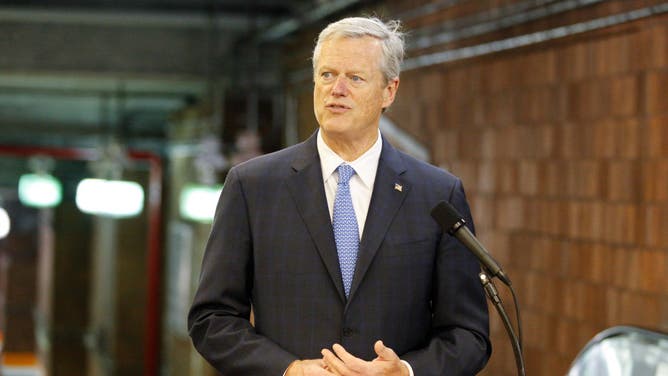"Jock-ocracy" Winning Again: U.S. Department Of Justice Sides With Trending Lawsuit Vs. NCAA For Multiple Transfers
What are student-athletes going to get next in a world where "Jock-ocracy" reigns supreme?
Many college football and basketball players are making millions of dollars through Name, Image & Likeness that began in 2021. Don't forget they also get free scholarships and countless freebies that normal students do not, such as medical care, state of the art nutrition and the best of training and overall health care.
"The simple truth is they currently benefit from scholarships and from a whole series of other mechanisms that schools make available to enhance their educational experience," NCAA president Charlie Baker said Thursday before a House subcommittee in Washington D.C. about the problems with NIL that are NCAA Transfer Portal related.

Charlie Baker fears state laws are interfering with the NCAA regarding the NCAA Transfer Portal and Name, Image & Likeness. (Getty Images)
Should Athletes Be Able To Freely Transfer Multiple Times?
And if after a few months, players don't like the school they spent years deciding upon that has invested heavily in them, they can just enter the NCAA Transfer Portal and find a new school without having to sit out a year as in the past. That rule made players think before they jumped. Or they can transfer for another year or two of play without sitting out after graduating early as graduate transfers.
Graduating? I'd love to see some of the jumbled transcripts and graduation rates if a popular lawsuit against the NCAA demanding athletes get multiple transfers without penalty passes. That suit continued to gain steam on Thursday.
The United States Department of Justice joined 10 other states and the District of Columbia in a lawsuit that challenges the NCAA's transfer eligibility rule. The DOJ calls the rule "an illegal restraint" against college athletes' "ability to sell their image and likeness and control their education."
Interesting wording there. College athletes transferring multiple times in itself can put their education out of control, if they're really interested in their education. Have not heard of any athletes transferring because they didn't like the Geology program at their school since transfers without consequences began in 2021. It is usually more because they can't beat out the players in front of them.
College Athletes Manipulate The NCAA Transfer Portal
This why I call the NCAA Transfer Portal the NCAA Backup Portal, or the NCAA Quitter Portal.
An "illegal restraint against college athletes' ability to sell their image and likeness." What? Athletes who have been transferring to other schools and playing the very next season in just a few months are usually making more NIL money because of the transfer.
Players also often threaten their original school with a possible transfer by entering the portal, so they can get more NIL money at their original school. Believe me, many of these athletes are not restrained.
But the jock sniffers roll on. The District of Columbia, Minnesota, Mississippi and Virginia joined Ohio and the original lawsuit Thursday. Previous states at the party include Colorado, Illinois, New York, North Carolina, Tennessee and West Virginia.

Ohio Attorney General Dave Yost has been active in a lawsuit against the NCAA's rule on one-time transfers for athletes with a lawsuit involving several states. (Getty Images)
"There is strength in numbers," cried Ohio Attorney General Dave Yost in a press release Thursday. "This case would never have come to pass had many players not been sidelined by the NCAA arbitrary and unfair rule. We're fighting for better competition and long-term change."
How is switching schools as soon as you realize you're not starting "better competition?"
Arbitrary? Wrong. This rule has the kids in mind, because kids tend to make rash decisions.
Players transferring too early in their college careers is too often short-sighted. And these decisions are too often made by true freshmen who are still too young to fully consider the "long-term" consequences.
Sticking it out is a better form of education. What is wrong is with sitting out a year, by the way? Players can get stronger, more skilled and actually find out where all their classrooms are.
A trial date in the case has not been scheduled.
Ohio Attorney General Dave Yost Criticizes NCAA
"It just shows that the Ohio-led lawsuit here against the NCAA is on solid footing," Dave Yost said in video conference.
Solid footing, or just joining the bandwagon against the NCAA and for the Jock-ocracy?
"The fact that we've got other states coming in, and the federal government is joining our lawsuit is a sign that other people see that we're right on the law," Yost said.
Or recognizing something is trending and just joining the crowd not thinking clearly.
"Look, the NCAA has evolved over time, but since recent court decisions have come down, it is becoming increasingly clear that model that worked in 1993 is not the model that will work now or is legal," Yost said. "It's time to recognize that college sports has become big, big business. And it needs to be treated that way under the same kind of laws, same competition requirements that other businesses have to live by."
Charlie Baker Criticized States' Involvement In NCAA Matters
Other businesses, though, are much more organized than the way the portal and NIL have been governed in their early years. There is a mess of unorganized state laws across the country, for example, that hurt the uniformity of the portal or NIL.
That is part of the reason why Charlie Baker appeared Thursday at a House subcommittee hearing on Capitol Hill on the NIL Playbook - a proposal for future laws to protect student-athletes deal making rights.
"States are passing laws to disadvantage schools in other states," Baker said. "We need legal backing to regulations that provide consumer protections, such as some form of uniform contract. That exists by the way in every other financial market in the United States. We need to be creating what I would describe as equilibrium in a world that too many currently feel is completely disequilibrium."
Players transferring twice in two years or more is clearly disequilibrium, and should be stopped.